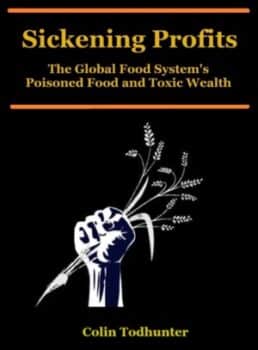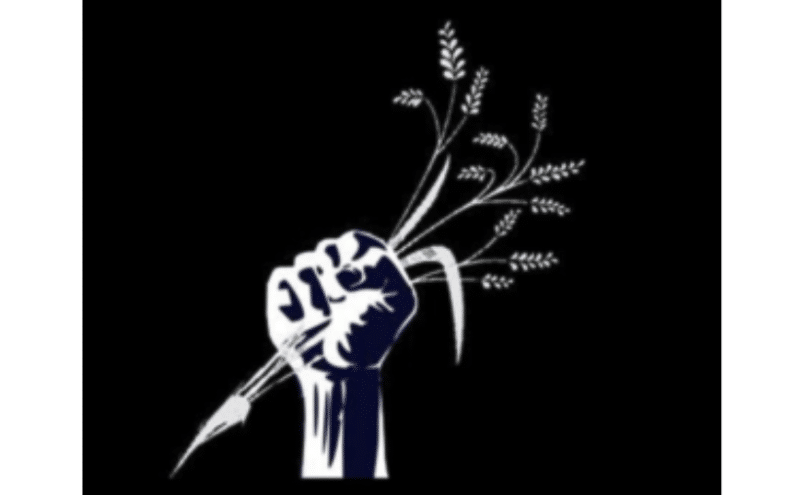The modern food system is being shaped by the capitalist imperative for profit. Aside from losing their land to global investors and big agribusiness concerns, farmers and ordinary people are being sickened by corporations and a system that thrives on the promotion of ‘junk’ (ultra-processed) food laced with harmful chemicals and cultivated with the use of toxic agrochemicals.

Sickening Profits:
The Global Food System’s
Poisoned Food and Toxic Wealth
by Colin Todhunter
It’s a highly profitable situation for investment firms like BlackRock, Vanguard, State Street, Fidelity and Capital Group and the food and agribusiness conglomerates they invest in. But BlackRock and others are not just heavily invested in the food industry. They also profit from illnesses and diseases resulting from the food system by having stakes in the pharmaceuticals sector as well. Institutional investors and wealthy individuals park their funds and wealth in these firms and depend on the financial system a toxic food system to deliver.
Lobbying by agrifood corporations and their well-placed, well-funded front groups ensures this situation prevails. They continue to capture policy-making and regulatory space at international and national levels and promote the (false) narrative that without their products the world would starve.
They are now also pushing a fake-green, ecomodernist agenda and rolling out their new proprietary technologies in order to further entrench their grip on a global food system that produces poor food, illness, environmental degradation, dependency and dispossession.
The prevailing globalised agrifood model is built on unjust trade policies, the leveraging of sovereign debt to benefit powerful interests, population displacement and land dispossession. It fuels export-oriented commodity monocropping and regional food insecurity.
This model is responsible for increasing rates of illness, nutrient-deficient diets, a narrowing of the range of food crops, chemical runoffs, increasing levels of farmer indebtedness and the eradication of biodiversity. And it relies on a policy paradigm that privileges urbanisation, global markets and agrifood corporations’ needs ahead of rural communities, local markets, on-farm resources and food sovereignty.
In addition, there are also the broader geopolitical aspects of food and agriculture in a post-COVID world characterised by food inflation, hardship and multi-trillion-dollar global debt.
There are huge environmental, political, social and health issues that stem from how much of our food is currently produced and consumed. A paradigm shift is required.
All of this is set out in Sickening Profits: The Global Food System’s Poisoned Food and Toxic Wealth (December 2023), published as an open-access (free) e-book by Global Research and is a follow up to the author’s book Food, Dispossession and Dependency: Resisting the New World Order (2022).
That book contains substantial sections on the agrarian crisis in India and issues affecting the agriculture sector. Aruna Rodrigues–prominent campaigner and lead petitioner in the GMO Mustard Public Interest Litigation currently being heard in the Supreme Court of India —stated the following about the book:
This is graphic, a detailed horror tale in the making for India, an exposé on what is planned, to hand over Indian sovereignty and food security to big business.
‘Sickening Profits’ continues in a similar vein. By describing situations in Ukraine, India, the Netherlands and elsewhere, it is another graphic horror tale in the making that is being intensified across the globe. The question is: Can it be stopped?
Frederic Mousseau, policy director at the Oakland Institute, an influential U.S.-based think tank, says:
It takes a book to break down the dynamics that are pushing agro-chemical agriculture to farmers and consumers around the world and to reveal the strength of the diverse movement of people and organizations who stand in the way of these destructive and predatory forces.
Colin Todhunter takes readers on a world tour that makes a compelling case against the fallacy of the food scarcity and Green Revolution arguments advanced by the mainstream media and international institutions on behalf of powerful financial interests such as Blackrock, Vanguard, or Gates. Todhunter makes it obvious that a key factor of world hunger and of the environmental crisis we are facing is a capitalist system that ‘requires constant growth, expanding markets and sufficient demand.’
Uplifting rather than depressing, after this lucid diagnosis, he highlights some of the countless people-led initiatives and movements, from Cuba, Ethiopia to India, that fight back against destruction and predation with agroecology and farmers-led practices, respectful of the people and the planet. By debunking the “artificial scarcity” myth that is constantly fed to us, Todhunter demonstrates that it is actually not complicated to change course. Readers will just have to join the movement.
The Centre for Research on Globalization (CRG) is “an independent research and media group of writers, scholars, journalists and activists” and believes in “open access to truthful information and nuanced reporting”. It is committed to publishing e-books that are free of charge. Sickening Profits: The Global Food System’s Poisoned Food and Toxic Wealth can be read directly on the GRG site here and can also be accessed and downloaded as a fully formatted pdf (numbered contents/pages etc) on the academia.edu website here.
Colin Todhunter is an independent writer specializing in development, food and agriculture. You can read his new e-book Food, Dependency and Dispossession: Resisting the New World Order for free here.

